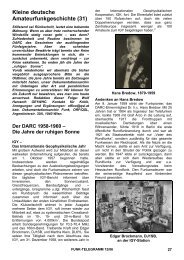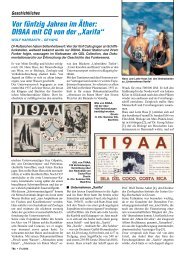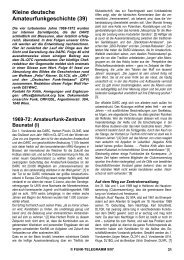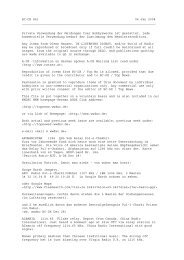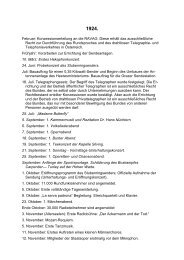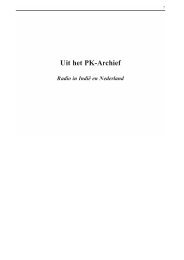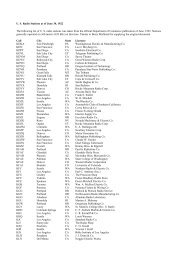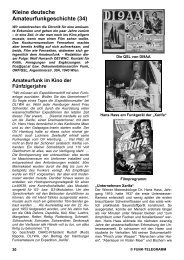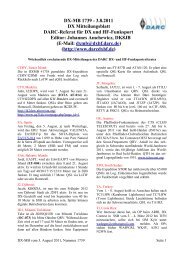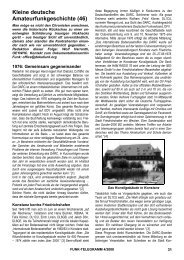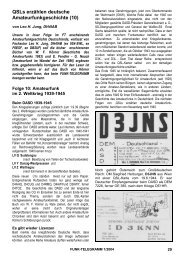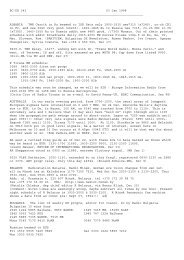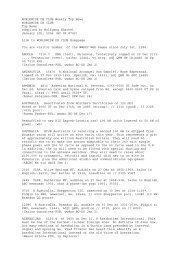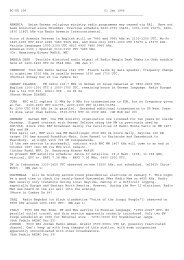- Page 1 and 2:
Von: BueschelW@web.de im Auftrag vo
- Page 3 and 4:
shifitng back of Bangladesh timings
- Page 5 and 6:
In 2007, the Chinese Embassy sent a
- Page 7 and 8:
announcer. Audio scratchs like so f
- Page 9 and 10:
9526 Voice of Indonesia, Cimanggis,
- Page 11 and 12: Radio Voice of People 0400-0500 116
- Page 13 and 14: station will be "ARCTIC RADIO MOROK
- Page 15 and 16: Merchant marine Larry Fields is vis
- Page 17 and 18: Ceausescu's last public appearance
- Page 19 and 20: aus gut sichtbar verlinkt: Neu sch
- Page 21 and 22: 1400-1500 on 1593 11805 13740 15160
- Page 23 and 24: or by writing to Radio Station WJHR
- Page 25 and 26: oadcasters with limited space and b
- Page 27 and 28: BC-DX 946 08 Jan 2010 _____________
- Page 29 and 30: You will also find this report on t
- Page 31 and 32: CYPRUS Typical British OHR from Lim
- Page 33 and 34: which carried on 14 trucks and was
- Page 35 and 36: (wb, wwdxc BC-DX TopNews Jan 4,
- Page 37 and 38: Each time in the past decade (rathe
- Page 39 and 40: India Radio uebernehmen (FM Gold, F
- Page 41 and 42: NETH ANTILLES [Bonaire] Frequency c
- Page 43 and 44: PAKISTAN Frequency change of Radio
- Page 45 and 46: frequency. // 5990 kHz via V-group
- Page 47 and 48: 1600-1700 on 5895 7380 2000-2100 on
- Page 49 and 50: 1089 RUSSIA Radio Rossii, Tbilisska
- Page 51 and 52: Dec) which seemed best. 6030 ETHIOP
- Page 53 and 54: 'Transradio Bln.' with Stereo at 20
- Page 55 and 56: French language service I am listen
- Page 57 and 58: In 1963, a series of test broadcast
- Page 59 and 60: 73, ex-VR2BG/p. Brett Graham in INT
- Page 61: CHINA/MALAYSIA 5030 CNR-1 confirms
- Page 65 and 66: another day. (Dr. John Barnard-Alb-
- Page 67 and 68: Hessischer Rundfunk not only abando
- Page 69 and 70: 11855 KSDA AWR Guam in Mandarin, ch
- Page 71 and 72: 1300-1357 on 17670 kHz AWR (Vietnam
- Page 73 and 74: MYANMAR 5985 Myanmar R hrd Jan 6 fr
- Page 75 and 76: 11995 0130-0200 smtwtfs Singapore 2
- Page 77 and 78: [Radio Voice of the People (2nd px)
- Page 79 and 80: RFE/RL Launches Radio Station in Pa
- Page 81 and 82: Still much stronger than Brother Sc
- Page 83 and 84: Ted was a member of the ARDXC and S
- Page 85 and 86: HNG Miskolc 1116 kHz 12 kW Former
- Page 87 and 88: (wb, wwdxc BC-DX TopNews Jan 21) BU
- Page 89 and 90: SW TXsite Jan 20) In this week's T
- Page 91 and 92: TALKING POINT END OF THE ROAD FOR S
- Page 93 and 94: as Darwin shuts down at the end of
- Page 95 and 96: UTC MONDAY PROGRAM 0000-0005 News I
- Page 97 and 98: UTC FRIDAY PROGRAM 0000-0005 News I
- Page 99 and 100: (? Normally off air) So some unusua
- Page 101 and 102: Radio Australia via T8WH Palau. I c
- Page 103 and 104: YFR; TEST; - All -; - All - (all da
- Page 105 and 106: Chinese service 1200-1300 on 9390 a
- Page 107 and 108: l> 5 SW masts at 46 50 27.70 N 142
- Page 109 and 110: 11605 IRA 250 kW 340 deg 13700 IRA
- Page 111 and 112: (Nobuya Kato in Aswan-EGY, dswci DX
- Page 113 and 114:
4747 PERU, Radio Huanta 2000, 2340-
- Page 115 and 116:
erfassen, wurden dutzende Patentsch
- Page 117 and 118:
15344.89...88 kHz by RAE Buenos Air
- Page 119 and 120:
9880 1430-1530 3 JCI Japanese - Fur
- Page 121 and 122:
Goncalves tip, noted all alone on f
- Page 123 and 124:
1100-1127 7345 100 C. Europe 1300-1
- Page 125 and 126:
January 2010. The Expo bannered und
- Page 127 and 128:
MEXICO 6104.76 XEQM, Candela FM, Me
- Page 129 and 130:
oder auf dem Kinderspielplatz Cl
- Page 131 and 132:
57.084961&ie=UTF8&ll=24.061434,120.
- Page 133 and 134:
in background 4mast of 1521 kHz 15
- Page 135 and 136:
5.05> (wb, wwdxc BC-DX TopNews Jan
- Page 137 and 138:
website Main Station Record - W
- Page 139 and 140:
(Ralph Brandi-NJ-USA, DXplorer Jan
- Page 141 and 142:
BC-DX 950 05 Feb 2010 _____________
- Page 143 and 144:
1700-1730 9840 DHA 300 kW 240 deg t
- Page 145 and 146:
koennen. Auf der anderen Seite stel
- Page 147 and 148:
5940 ditto, 2327-..., same day, ann
- Page 149 and 150:
ETHIOPIA 7165 R. Ethiopia-Ext. Sce.
- Page 151 and 152:
D IBB LW VOA Munich Erching 173 kHz
- Page 153 and 154:
AFN Munich 548 / 1106 kHz VOA Muni
- Page 155 and 156:
can be a single hop from the target
- Page 157 and 158:
IND Calcutta Magra MW 594 & 1134 kH
- Page 159 and 160:
SBS / HLSQ Ilsan, Goyang 792 kHz 50
- Page 161 and 162:
dismantled by the end of June 2004;
- Page 163 and 164:
phone line quality. Program content
- Page 165 and 166:
1045-1145 Hindi 9375 11570 1145-121
- Page 167 and 168:
API-3 6235 1445-1545 PST Pakistan S
- Page 169 and 170:
(Technical service GTRK "Voice of R
- Page 171 and 172:
(via Andy Sennitt-HOL, hcdx Feb 1)
- Page 173 and 174:
and the Office of Cuba Broadcasting
- Page 175 and 176:
(Carlos Goncalves-POR, wwdxc BC-DX
- Page 177 and 178:
86.859562&sspn=0.009326,0.013797&ie
- Page 179 and 180:
d=IuUEgZu1iDCYELFT1FrGOg&cbp=12,122
- Page 181 and 182:
Dates: May 14-16 Location: Dayton,
- Page 183 and 184:
BC-DX 951 13 Feb 2010 _____________
- Page 185 and 186:
Southern Sudan Interactive Radio In
- Page 187 and 188:
oadcasting to Asia. The original le
- Page 189 and 190:
55 40 49.30 N 12 21 11.35 E commun
- Page 191 and 192:
(The Disco Palace, via dxld Feb 11)
- Page 193 and 194:
[later] 0600-0650 UT Greek sce on 7
- Page 195 and 196:
RAI Caltanisetta LW MW formerSW 399
- Page 197 and 198:
Perseus. These are also possible in
- Page 199 and 200:
MONGOLIA/RUSSIA Checked on differen
- Page 201 and 202:
LW 1075m (279 kHz) voor een uitgest
- Page 203 and 204:
(Noel Green-UK, dxld Feb 9) I hope
- Page 205 and 206:
The coordinates are for 846/1359 kH
- Page 207 and 208:
from German Newsgroup A-DX: 5020/95
- Page 209 and 210:
next / behind to the museum house:
- Page 211 and 212:
55 48 40.29 N 13 43 43.54 E (wb,
- Page 213 and 214:
(via Wolf-DK2OM, DARC / IARU Bandwa
- Page 215 and 216:
I've my doubts on the Google Earth
- Page 217 and 218:
click on (GH, dxld Feb 11) 5446.5u
- Page 219 and 220:
guide to British domestic AM and FM
- Page 221 and 222:
2219 UT, Morocco is off, leaving ve
- Page 223 and 224:
(wb, wwdxc BC-DX TopNews Feb 13) Ke
- Page 225 and 226:
CUBA Transmission of RHC's 2030-213
- Page 227 and 228:
officials are trying to figure out
- Page 229 and 230:
Petritag, wieder eine einstuendige
- Page 231 and 232:
features. British Broadcasting Corp
- Page 233 and 234:
(wb, wwdxc BC-DX TopNews Feb 16) Ro
- Page 235 and 236:
(wb, wwdxc BC-DX TopNews Feb 16)
- Page 237 and 238:
(Brian Alexander-PA-USA, hcdx Feb 1
- Page 239 and 240:
48 56 55.74 N 21 15 58.28 E Three
- Page 241 and 242:
(Ian Baxter-AUS, SW TXsite Feb 13)
- Page 243 and 244:
could hear something like "Saut al
- Page 245 and 246:
Dabei werden unsere Fragen nicht un
- Page 247 and 248:
13, via CVC Lusaka Makeni ranch sit
- Page 249 and 250:
serious studies on radio propagatio
- Page 251 and 252:
BC-DX 953 26 Feb 2010 _____________
- Page 253 and 254:
Suaab Xaa Moo Zoo in Hmong from Feb
- Page 255 and 256:
am Mittwoch, 24. Februar 2010, live
- Page 257 and 258:
(Victor Goonetilleke-CLN 4S7VK, UAD
- Page 259 and 260:
CLANDESTINE RADIO STATIONS. Voice o
- Page 261 and 262:
idges or mx underneath, cut off mid
- Page 263 and 264:
No sign of any jamming so I guess t
- Page 265 and 266:
kHz at 0112 UT. This is so much bet
- Page 267 and 268:
0000-0100 11605 GUF 250 kW 181 deg
- Page 269 and 270:
eal information about this matter i
- Page 271 and 272:
unterladen: Salue. (Paul Reinersch
- Page 273 and 274:
2nd mast scrapped since 2003 image
- Page 275 and 276:
- Page 277 and 278:
11.77> and another special se
- Page 279 and 280:
ll=40.421994,17.286251&panoid=mk7Bm
- Page 281 and 282:
ITA Rai Perugia Torgiano 999 kH
- Page 283 and 284:
SINPO 44433. Female talk till 1035
- Page 285 and 286:
und siehe hier: (Theo Averbeck-D,
- Page 287 and 288:
about corruption in the Pacific (i.
- Page 289 and 290:
full French transcripts on the next
- Page 291 and 292:
#*#*#*#*#*#*#*#*#*#*#*#*#*#*#*#*#*#
- Page 293 and 294:
1600-1700 17700 ASC 250 kW 065 deg
- Page 295 and 296:
(Herbert Meixner-AUT. A-DX M
- Page 297 and 298:
CANADA/ECUADOR/U.K. 6190 CRI in En
- Page 299 and 300:
normal, but also it will depend on
- Page 301 and 302:
mainland relay site Baoji-Xinjiezhe
- Page 303 and 304:
CROATIA B09 schedule, updated March
- Page 305 and 306:
Fuer weitere Informationen steht Ih
- Page 307 and 308:
1600-1700 9430 WER 250 kW 120 deg A
- Page 309 and 310:
1400-1500 13730 WER 250 kW 090 deg
- Page 311 and 312:
kHz. (Rumen Pankov-BUL, wwdxc BC-DX
- Page 313 and 314:
47.36%22N++12%C2%B021%2745.62%22E&s
- Page 315 and 316:
file:///E|/datentransfer/wwdfxc_201
- Page 317 and 318:
in 2008: (wb, wwdxc BC-D
- Page 319 and 320:
ut correction of RUS Sukhinichi 128
- Page 321 and 322:
morning", national anthem to 1204 U
- Page 323 and 324:
on FM at 0300-2100 (Unguja 97,4 and
- Page 325 and 326:
(Jamie Labadia, dxld Feb 28) Vanuat
- Page 327 and 328:
BC-DX 955 13 March 2010 ___________
- Page 329 and 330:
Kazakh 1610-1625, Turkmen 1625-1640
- Page 331 and 332:
1700-1755 on 6010 WER 250 kW / 240
- Page 333 and 334:
SDA 1100-1200 Mandarin NoEa-China 1
- Page 335 and 336:
AUSTRIA/FRANCE/GERMANY A-10 SW sche
- Page 337 and 338:
Listen to these samples via the IBB
- Page 339 and 340:
0200-0300 daily CNm 9680 WYFR 100 0
- Page 341 and 342:
Info: Wegen der winterlichen Wetter
- Page 343 and 344:
Nur SWR Muehlacker 576, SWR Bodense
- Page 345 and 346:
Never heard an ID in several minute
- Page 347 and 348:
NETHERLANDS ANTILLES 15745 at 1300-
- Page 349 and 350:
0400-0500 9480 KIGALI 250 30 Ost-Af
- Page 351 and 352:
2300-0000 9775 KIGALI 250 85 Suedos
- Page 353 and 354:
0000-0058 9885 TRINCOMALE 250 75 So
- Page 355 and 356:
IRK 7320 1500-1515 41 250 224 0 4/4
- Page 357 and 358:
TAIWAN I can receive mysterious SOH
- Page 359 and 360:
5970 kHz (Brovary) ch. UR1 - cancel
- Page 361 and 362:
U.K. [non] FEBA A-10 Radio Broadcas
- Page 363 and 364:
mode, but sort of RTTY with regular
- Page 365 and 366:
(PRW A-10 March 14) BELGIUM 6015drm
- Page 367 and 368:
Segue abaixo uma lista elaborada po
- Page 369 and 370:
1705-1904 SAC 9800 Transmitter Site
- Page 371 and 372:
0600-0700 7340[til May 1st, from Se
- Page 373 and 374:
12-14 Mar. (Carlos Goncalves-POR, w
- Page 375 and 376:
Sunday 1630-1800 Amharic 13810 kHz
- Page 377 and 378:
All our Shortwave Programs are avai
- Page 379 and 380:
Sueddeutscher Rundfunk closed some
- Page 381 and 382:
0500-0527 9855 13750 15150 17655 14
- Page 383 and 384:
27874&ie=UTF8&ll=41.802629,12.51804
- Page 385 and 386:
0100-0700 AS 15195 0200-0300 seAS 1
- Page 387 and 388:
Pyongyang, 1610-1622, 14 Mar'10, Ko
- Page 389 and 390:
South East Asia Urdu 0045-0215 1158
- Page 391 and 392:
Vietnamese 2330-2357 9670 0130-0230
- Page 393 and 394:
(wb, SW TXsite March 12) Ufa: The r
- Page 395 and 396:
(taken from Solomon Star, 18 March;
- Page 397 and 398:
1700-1730 13600 (100 degr) 0230-030
- Page 399 and 400:
(Edward Kusalik-Alb-CAN, DXplorer M
- Page 401 and 402:
Regarding climactic conditions in K
- Page 403 and 404:
issued shortly. Geoff of VTC says t
- Page 405 and 406:
BC-DX 957 26 March 2010 ___________
- Page 407 and 408:
ASCENSION ISL Additional txion of W
- Page 409 and 410:
0400-0500 Sat/Sun West Europe 6200
- Page 411 and 412:
0510-0530 Sun 6200 7400 0510-0530 M
- Page 413 and 414:
That's not new meter band for RHC,
- Page 415 and 416:
Sommersendehalbjahr jeweils einmal
- Page 417 and 418:
Daily maintenance at 1000-1100 UT W
- Page 419 and 420:
Venezuela Mon-Fri/Tue-Sat 2300-0200
- Page 421 and 422:
But looks like 4.8 or 6 MH
- Page 423 and 424:
# Sackville Canada relay 250 kW / 2
- Page 425 and 426:
1260 0100 0130 s.....s Moscow 10 0
- Page 427 and 428:
5875 2200 2300 smtwt.. Nakhon Sawan
- Page 429 and 430:
7350 0130 0200 ....... Cyprus 250 9
- Page 431 and 432:
9915 1500 1700 .mtwtf. Cyprus 250 3
- Page 433 and 434:
13660 1800 1900 ....... Moosbrunn 1
- Page 435 and 436:
17790 0700 1200 ....... A'Seela 250
- Page 437 and 438:
Uyghur (2 hours daily) 0100-0200 93
- Page 439 and 440:
Willi Fuehles, Germany - 22 Februar
- Page 441 and 442:
Viel Spass beim Hoeren (Michael Sch
- Page 443 and 444:
BC-DX 958 2 April 2010 ____________
- Page 445 and 446:
AUSTRALIA HCA AUSTRALIA A-10 schedu
- Page 447 and 448:
(wb, wwdxc BC-DX TopNews March 29)
- Page 449 and 450:
Europe, Sitkunai Lithuania, 100 kW
- Page 451 and 452:
This transmitters used a self-r
- Page 453 and 454:
das die Auflistung unvollstaendig i
- Page 455 and 456:
official link shown below: Note: F
- Page 457 and 458:
1400-1430 seAS 11705 1400-1430 AS 1
- Page 459 and 460:
The annual magazine for serious DXe
- Page 461 and 462:
2030-2100 738 (AM) Moscow Spanish 0
- Page 463 and 464:
NIGERIA Thanks to Ian of SW TX site
- Page 465 and 466:
At the time of partition between In
- Page 467 and 468:
0900-0956 on 11830 15240 15380 1760
- Page 469 and 470:
(RC-3, Radiocenter 3 Taldom Moscow,
- Page 471 and 472:
The programme is broadcast through
- Page 473 and 474:
As of March 9 a second transmitter,
- Page 475 and 476:
BC-DX 959 9 April 2010 ____________
- Page 477 and 478:
1730-1757 on 7205 SPANISH 0000-0027
- Page 479 and 480:
The amended announced measures to o
- Page 481 and 482:
(Kai Ludwig-D, dxld Apr 8) Bulgaria
- Page 483 and 484:
former LORAN station, next to the b
- Page 485 and 486:
1700-1757z on 7335BEI & 9435URU kHz
- Page 487 and 488:
GERMANY/HUNGARY Summer A-10 schedul
- Page 489 and 490:
40 41 07.06 N 129 12 09.88 E Tenta
- Page 491 and 492:
unknown target area at 345deg, most
- Page 493 and 494:
2200 Chinese 9975 11535 CHN 2200 Ja
- Page 495 and 496:
permanent change? (Martien Groot-HO
- Page 497 and 498:
1200-1300 11500TCH 11755TJK 1300-14
- Page 499 and 500:
1700-1730 9600 250 East Africa Swah
- Page 501 and 502:
0600-0615 11640 500 Nigeria 67 Engl
- Page 503 and 504:
TAJIKISTAN UNID 17495 Still a puzzl
- Page 505 and 506:
support services group with sales o
- Page 507 and 508:
told me that IBB would have liked m
- Page 509 and 510:
BC-DX 960 17 April 2010 ___________
- Page 511 and 512:
7245 2100 2200 28NE,29W WOF 125 78
- Page 513 and 514:
with utility high side. Only Bolivi
- Page 515 and 516:
The signal that I have observed on
- Page 517 and 518:
usual 1430-1500 UT on 7350 (in the
- Page 519 and 520:
GERMANY Fax: +49 6172 123117 E-Mail
- Page 521 and 522:
Forward from A-DX ng. Disassembling
- Page 523 and 524:
("lokale" Versorgung um Kuwait uebe
- Page 525 and 526:
(David Sharp-NSW-AUS, hcdx April 15
- Page 527 and 528:
QSL adresses aof 2006: Radio Abuja
- Page 529 and 530:
* to avoid Vatican Radio in Hindi/T
- Page 531 and 532:
13775 1200 1500 RIY 500 70 URDU 151
- Page 533 and 534:
comprehensive and balanced way, the
- Page 535 and 536:
(Steve Lusetx, dxld April 15) I res
- Page 537 and 538:
Problem 7250 / 7360 in A-10 From Ma
- Page 539 and 540:
BC-DX 961 24 April 2010 ___________
- Page 541 and 542:
This situation soon caused a change
- Page 543 and 544:
9550.1 ditto, 2124-2139, 16 Apr'10,
- Page 545 and 546:
Yesterday heard Holy Tibet from 163
- Page 547 and 548:
711 9+20dB D SWR ContRa Heilbronn O
- Page 549 and 550:
In den Anrufen und Schreiben der ve
- Page 551 and 552:
Yesterday evening and this morning
- Page 553 and 554:
21540 1005-1505 27,28 KBD 500 310 9
- Page 555 and 556:
NETHERLANDS/ AUSTRIA Media Network:
- Page 557 and 558:
To complete with yesterday's and cu
- Page 559 and 560:
1500-1900 12040 Moscow 200 Europe 1
- Page 561 and 562:
Spanish 0000-0100 11510 Dushanbe TJ
- Page 563 and 564:
1300-1400 1251 Dushanbe TJK 500 CIS
- Page 565 and 566:
828 0900-1300 Radiogazeta Slovo Rus
- Page 567 and 568:
the news, reviewing some headlines,
- Page 569 and 570:
Time Language Target Frequency (kHz
- Page 571 and 572:
oadcasting stations on 2300 - 5700
- Page 573 and 574:
BC-DX 962 01 May 2010 _____________
- Page 575 and 576:
(27 Apr, Kim Andrew Elliott, via d
- Page 577 and 578:
4765 1521 TJK Tajik Radio - 1, Taji
- Page 579 and 580:
13970, very good/strong 15140, good
- Page 581 and 582:
Yes, and this is part of our statio
- Page 583 and 584:
I know only a single more S 4105 ha
- Page 585 and 586:
Technisch: 100 kW aus Wertachtal in
- Page 587 and 588:
Sonntag 23.05. 0900-1000 Radio Glor
- Page 589 and 590:
3995 RRI Kendari at 1251 in Indones
- Page 591 and 592:
a new frequency, but who else in Ar
- Page 593 and 594:
KTR - which was established in 1958
- Page 595 and 596:
In Basarabi - wine growing Murfatla
- Page 597 and 598:
emerkbar - das Programm duerfte dan
- Page 599 and 600:
(Rumen Pankov-BUL, wwdxc BC-DX TopN
- Page 601 and 602:
Glenn, 9540 is correct as per the 1
- Page 603 and 604:
BC-DX 963 10 May 2010 _____________
- Page 605 and 606:
Im Projekt Verzeichnis scheint
- Page 607 and 608:
9770 some S=2 signal - probably - f
- Page 609 and 610:
0300-0330 on 6055 BOT 100 kW 010 de
- Page 611 and 612:
Firedrake scan 0318 to 0338, April
- Page 613 and 614:
EGYPT Updated summer A-10 of Radio
- Page 615 and 616:
clandestine, at 1709 UT on May 01,
- Page 617 and 618:
125 kW non-dir 926 (Quadrant antenn
- Page 619 and 620:
The old TX site of National Communi
- Page 621 and 622:
on 6055 kHz. (wb, wwdxc BC-DX TopNe
- Page 623 and 624:
1700-1800 on 7395 MDC 050 kW 310 de
- Page 625 and 626:
RUSSIA/KALININGRAD Summer A-10 sche
- Page 627 and 628:
copy. Quick scans of 25 and even 31
- Page 629 and 630:
1800-1945 NF 12070 WOF 300 kW 137 d
- Page 631 and 632:
VIETNAM 5925 VOV-2 [+ CNR-5], at 16
- Page 633 and 634:
BC-DX 964 17 May 2010 _____________
- Page 635 and 636:
most powerful signal in 0300-0400 U
- Page 637 and 638:
not observed in // with the shortwa
- Page 639 and 640:
teachings broadcast everyday on Fam
- Page 641 and 642:
voice-over tlk. Good signal but hor
- Page 643 and 644:
0900-1000 UT 9690 kHz 1500-1600 UT
- Page 645 and 646:
Radio Pakistan two NEW 100 kW short
- Page 647 and 648:
UK 15760 Rocks The World this Sunda
- Page 649 and 650:
2100-2145 17845 2200-2300 7420WER A
- Page 651 and 652:
1900-2100 6020MDG, 9610WER 2000-210
- Page 653 and 654:
Italiano In Europa E Nordafrika UTC
- Page 655 and 656:
Russian to Russia UTC kHz 0400-0500
- Page 657 and 658:
Vietnamese to South East Asia UTC k
- Page 659 and 660:
vy73 de Wolfgang DF5SX END file:///
- Page 661 and 662:
9665.470 Voz Missionaria, Florianop
- Page 663 and 664:
also three SW curtains Kabirpu
- Page 665 and 666:
11790 IRA 250 kW / 275 deg 1800-190
- Page 667 and 668:
9545 IBB Tinang 0000-0300 9565 IBB
- Page 669 and 670:
kHz, and how! Supposedly scheduled
- Page 671 and 672:
TWR Radio Partnerships Director Joh
- Page 673 and 674:
(Patrick Robic-AUT, A-DX May 23) GU
- Page 675 and 676:
5060 CHN Xinjiang PBS,Urumqi // 395
- Page 677 and 678:
4025 Liberia's Star Radio reactivat
- Page 679 and 680:
vernacular; at 1330 UT became // 59
- Page 681 and 682:
eceived by many Japanese DXer. Howe
- Page 683 and 684:
up at the tx site. SW is scheduled
- Page 685 and 686:
spurious signal, til 0600 UT May 18
- Page 687 and 688:
(wb, wwdxc BC-DX TopNews May 23) UK
- Page 689 and 690:
7325 0000-0330 smtwtfs Rampisham 50
- Page 691 and 692:
Moore Days Area kHz 1930-1945 mtw..
- Page 693 and 694:
very modest also - only once in a w
- Page 695 and 696:
BC-DX 966 03 June 2010 ____________
- Page 697 and 698:
(Brian Alexander-USA in Dxplorer, v
- Page 699 and 700:
zu ihrer Unterhaltung eine lokale U
- Page 701 and 702:
enthusiastic talk over there for a
- Page 703 and 704:
channel like SW. The Star R Station
- Page 705 and 706:
RUSSIA 11655 Man hat beim deutschen
- Page 707 and 708:
And also the Shijak transmitter cen
- Page 709 and 710:
e just that, but I think it's out o
- Page 711 and 712:
#*#*#*#*#*#*#*#*#*#*#*#*#*#*#*#*#*#
- Page 713 and 714:
1600-1757 on 9555 CER 150 kW / 140
- Page 715 and 716:
0000-0200 17880 SDA 100 kW 315 deg,
- Page 717 and 718:
4815 R. Difusora, Londrina PR, 2216
- Page 719 and 720:
11749.8 R. Voz Missionaria, Cambori
- Page 721 and 722:
Heute am 9.Juni: Radio Habana Cuba
- Page 723 and 724:
5080 North 4th Street, Coeur d'Alen
- Page 725 and 726:
2300-2400 NF 13805 UDO 250 kW / 030
- Page 727 and 728:
purchase of some new DRM transmitte
- Page 729 and 730:
Channel selection 1386 kHz is still
- Page 731 and 732:
meaning; even with CRI QRM was able
- Page 733 and 734:
0800-0900 on 11565 0900-1000 on 736
- Page 735 and 736:
1500-1755 15225 RIY 500 kW 295 deg
- Page 737 and 738:
connection is required instead of a
- Page 739 and 740:
(Glenn Hauser-OK-USA, dxld June 2)
- Page 741 and 742:
VOA in Pashto via Iranawila on 1153
- Page 743 and 744:
0600-0700 13760SAI, 15120TIN, 15615
- Page 745 and 746:
BC-DX 968 17 June 2010 ____________
- Page 747 and 748:
previously on the air at the large
- Page 749 and 750:
Contact: ORS Moosbrunn Ing. Ernst S
- Page 751 and 752:
7110 R. Ethiopia on Jun 08 at 1608-
- Page 753 and 754:
(Carlos Goncalves-POR, wwdxc BC-DX
- Page 755 and 756:
.084961&ie=UTF8&ll=- 26.569644,28.1
- Page 757 and 758:
AFS Thohoyandou 1035 kHz 50 kW
- Page 759 and 760:
Sound reminds me rather via Issoudu
- Page 761 and 762:
Coast vv Portugal team via RDP shor
- Page 763 and 764:
BC-DX 969 24 June 2010 ____________
- Page 765 and 766:
BRAZIL 9665.2 R. Marumby, Florianop
- Page 767 and 768:
GERMANY [GAMBIA non] This new progr
- Page 769 and 770:
um Koenigs Wusterhausen die Frequen
- Page 771 and 772:
Latest info received shows that the
- Page 773 and 774:
in USB + carrier mode) and 6134.9v
- Page 775 and 776:
Bengali 0030-0057 on 11945 PUG 250
- Page 777 and 778:
SWEDEN Summer A-10 schedule of Radi
- Page 779 and 780:
wissen. Ich kann die weltweite Lief
- Page 781 and 782:
1900-2030 on 9550 KIG 250 kW / 030
- Page 783 and 784:
they currently have a Chinese built
- Page 785 and 786:
nal/2476356.jpg> RMC-RCI Cabannelle
- Page 787 and 788:
0800-0900 "Road Taken, Road Left".
- Page 789 and 790:
Another one is included in the TDF
- Page 791 and 792:
MALAYSIA Google Earth imagery. Some
- Page 793 and 794:
(R BULGARIA DX MIX News, Ivo Ivanov
- Page 795 and 796:
very first time. Gary Walters, the
- Page 797 and 798:
International's shortwave signal an
- Page 799 and 800:
0300-0400 7440 LV 600 kW 303 deg to
- Page 801 and 802:
(Anker Petersen-DEN, dswci DXW June
- Page 803 and 804:
- Radio Nacional de Venezuela, 1167
- Page 805 and 806:
BC-DX 971 10 July 2010 ____________
- Page 807 and 808:
2000-2100 on 9450 DHA 250 kW / 210
- Page 809 and 810:
Also domestic HF sites from GE upda
- Page 811 and 812:
9640 2200-2400 Spanish, Mesa Redond
- Page 813 and 814:
antenna of the broken S4001 transmi
- Page 815 and 816:
talk by female, ID in English! as:
- Page 817 and 818:
huge ute smack on the channel. Othe
- Page 819 and 820:
You can download 2 videos about con
- Page 821 and 822:
Vietnam. Confirmed, as 9840 kHz is
- Page 823 and 824:
9420AVL S=9+30dB RFI French 13695 S
- Page 825 and 826:
4810 AIR Bhopal sign on at 1130 UTC
- Page 827 and 828:
(Walt Salmaniw, Masset-B.C.-CAN, DX
- Page 829 and 830:
South Pacific aimed Wellbrook array
- Page 831 and 832:
talks, newscast; 25432. 11735 R. Tr
- Page 833 and 834:
Radio Romania Actualitata in Romani
- Page 835 and 836:
Auf dem Bild [Reproduktion aus dem
- Page 837 and 838:
(wb, wwdxc BC-DX TopNews July 16) J
- Page 839 and 840:
" co-ch 2100-2200 AWR KSDA Japanese
- Page 841 and 842:
1200-1357 17735 S=7 at 1355 UT, 130
- Page 843 and 844:
PALAU 9960 1430-, Furusato no Kaze
- Page 845 and 846:
etter than in Victoria, so I sure f
- Page 847 and 848:
audiences of the death of President
- Page 849 and 850:
1430; Mon 1545; Tue 0030, 1500; Wed
- Page 851 and 852:
1800-1900 9400 SOF 050 kW 306 deg t
- Page 853 and 854:
BC-DX 973 25 July 2010 ____________
- Page 855 and 856:
YFR Romanian 9895 WER (MBR) Test WE
- Page 857 and 858:
10.000 2130UT Observatorio, Rio de
- Page 859 and 860:
CANADA 6030 CFVP Calgary at 1148 UT
- Page 861 and 862:
15285, CNR1 and BBCWS Mandarin via
- Page 863 and 864:
morning sce 7320.00 even July 20 at
- Page 865 and 866:
7330, 1800-1900 9895 WER 100 kW / 1
- Page 867 and 868:
Hoerer an Rhein und Ruhr. Bislang w
- Page 869 and 870:
(Robert Wilkner-FL-USA, DXplorer Ju
- Page 871 and 872:
and you will see a shot of the mast
- Page 873 and 874:
1600-1657 NF 11850@SAB 500 kW / 180
- Page 875 and 876:
YL talks including about woman and
- Page 877 and 878:
small radio museum. (Sergei Sodeki
- Page 879 and 880:
Flugzeuge haetten aber nie den Stan
- Page 881 and 882:
(Dragan Lekic-SER, dxld July 21) S
- Page 883 and 884:
936 UR-1 Starobelsk 27 0230-2200 97
- Page 885 and 886:
2200-0200 7440 Lviv 500kW 303deg to
- Page 887 and 888:
6145 - first seconds originate from
- Page 889 and 890:
No.Caucasus 0300-0400 on 7290 9480
- Page 891 and 892:
email: Tel: +31 35 5243507 Mob: +3
- Page 893 and 894:
three 40 foot containers ready for
- Page 895 and 896:
AUSTRIA/GERMANY Some Media Broadcas
- Page 897 and 898:
CANADA 6159.959 CKZN, 0450, July 30
- Page 899 and 900:
-, and you've got an internal IF im
- Page 901 and 902:
1000-1200 (Maintenance Break) Pregr
- Page 903 and 904:
LIBYA Today July 27th, VoAfrica fro
- Page 905 and 906:
very slight CODAR. Station drifted
- Page 907 and 908:
and Aleksinac mediumwave 1008 kHz 2
- Page 909 and 910:
2130-2200 on 7580 2200-2400 on 7595
- Page 911 and 912:
BC-DX 975 11 Aug 2010 _____________
- Page 913 and 914:
702 kHz. the // 6297 kHz remains of
- Page 915 and 916:
6134.825 Radio Santa Cruz, Santa Cr
- Page 917 and 918:
Varna 1 774 VRN 075 kW 0300-0100 RE
- Page 919 and 920:
P.O.Box 54912, Limassol, Cyprus. fr
- Page 921 and 922:
Hinweise auf Studio Wuerzburg, Stu
- Page 923 and 924:
program started from 1505 UT. 2. AI
- Page 925 and 926:
(Chuck Bolland-FL-USA, hcdx Aug 3)
- Page 927 and 928:
(wb, wwdxc BC-DX TopNews Aug 10) 59
- Page 929 and 930:
vy73 Wolfgang df5sx, ...und damit w
- Page 931 and 932:
4955 Radio Cultural Amauta Huanta 1
- Page 933 and 934:
RUS Ekaterinburg 33 SW mast
- Page 935 and 936:
RUS Chelyabinsk MW 738 kHz
- Page 937 and 938:
RUS new Kyzyl Tuva, both sides in m
- Page 939 and 940:
RUS Volgograd Dubovka Volga 1278 kH
- Page 941 and 942:
and lighthouse NDBeacon too no ph
- Page 943 and 944:
(Robert Wilkner-FL-USA, DXplorer Au
- Page 945 and 946:
1710 Fasting Programme. 1750 Instru
- Page 947 and 948:
UNIDENTIFIED 7219.981 at 0535 UT on
- Page 949 and 950:
1500-1600 on 13570 15530 English to
- Page 951 and 952:
DEPARTMENT OF STATE, FOREIGN OPERAT
- Page 953 and 954:
Almost three different Over the Hor
- Page 955 and 956:
ALG Rabouni RASD BC house 27 28 30.
- Page 957 and 958:
22 47 26.40 N 108 11 26.00 E 22 47
- Page 959 and 960:
{at least 4 txs for jamming purpose
- Page 961 and 962:
ones used by Media Broadcast in as
- Page 963 and 964:
day. (Jose Jacob-IND VU2JOS, dx_ind
- Page 965 and 966:
LJBC Voice of Africa heard on Aug 1
- Page 967 and 968:
25 or 31 mb 16 51 57.24 N 96 09 41.
- Page 969 and 970:
Die Mittelwelle bei 68 04 14.63 N 3
- Page 971 and 972:
EUROPE 1900-2030 UT 10 degrees INDI
- Page 973 and 974:
SLOVAKIA 7385 Miraya FM QSL, via IR
- Page 975 and 976:
(wb, wwdxc BC-DX TopNews Aug 13) UK
- Page 977 and 978:
15341.00 RTM program via Nador-MRC
- Page 979 and 980:
15285 !!?? on 1824 UT with HoA musi
- Page 981 and 982:
Ort: Wong's China Restaurant Lehene
- Page 983 and 984:
Shortwave Frequency Guide ... 2009/
- Page 985 and 986:
a whisper on the much weaker 7217v
- Page 987 and 988:
Brother Stair / The Overcomer Minis
- Page 989 and 990:
6115 and 279 kHz. I couldn't hear 6
- Page 991 and 992:
elay: 13760SAI, 15120TIN, 15615TIN,
- Page 993 and 994:
Meant for RIAS Berlin and VOA Washi
- Page 995 and 996:
in Ostbelgien und der Eifel auf UKW
- Page 997 and 998:
9525.96 VoIndonesia at 1300-1310 UT
- Page 999 and 1000:
esolution place. VE Update - Google
- Page 1001 and 1002:
In addition, the Kuwait station has
- Page 1003 and 1004:
At all levels, IBB staff members we
- Page 1005 and 1006:
RADIO 700 - Ihr Radio fuer die Regi
- Page 1007 and 1008:
+59+37+39.06+E&sll=51.151786,10.415
- Page 1009 and 1010:
check as, "... son las 7 menos 26 m
- Page 1011 and 1012:
Arabic talk at 0412 UT. Poor to fai
- Page 1013 and 1014:
Thanks to a tip from Zacharias Lian
- Page 1015 and 1016:
BC-DX 978 01 Sept 2010 ____________
- Page 1017 and 1018:
4974.8 R. Iguatemi, Osasco SP, 2145
- Page 1019 and 1020:
11855 R. Aparecida, 2113-2128, 13 A
- Page 1021 and 1022:
0317 UT Monday Aug 30, S=6 poor. Bu
- Page 1023 and 1024:
26/27) 1485 wieder in DRM? Ja das s
- Page 1025 and 1026:
(Albert Muick-AFG, hcdx Aug 26) 152
- Page 1027 and 1028:
There is another Iranian 75m channe
- Page 1029 and 1030:
satellite radio feed of the finals.
- Page 1031 and 1032:
SAO TOME E PRINCIPE 945 R. Nacional
- Page 1033 and 1034:
BBC R Cornwall BBC R Cumbria BBC
- Page 1035 and 1036:
BC-DX 979 12 Sept 2010 ____________
- Page 1037 and 1038:
1st program relay of Techno Rock po
- Page 1039 and 1040:
Best wishes, Sean. - Unquote - (Alo
- Page 1041 and 1042:
should be on 17550 kHz 1700-1800 UT
- Page 1043 and 1044:
heard whatsoever, just plain IPDA p
- Page 1045 and 1046:
nal/30523114.jpg> CHN Muling Shi
- Page 1047 and 1048:
CHN Yushu Shi 1107 kHz 10 kW 64m ma
- Page 1049 and 1050:
However, due to the budget cuts ear
- Page 1051 and 1052:
1900-2000 11840 WER 500 kW 210 deg
- Page 1053 and 1054:
7375 2200-0300 11,12,13,14,15,16 WE
- Page 1055 and 1056:
Good listening (Fabrizio Magrone, F
- Page 1057 and 1058:
Checked Sept 10th 1320 UT: 15341.14
- Page 1059 and 1060:
7.084961&ie=UTF8&ll=8.931139,7.0731
- Page 1061 and 1062:
RUS VoRUS (Novosibirsk) Oyash 1026
- Page 1063 and 1064:
RUS Tikhvin 1458 kHz 5 kW 120m 59 4
- Page 1065 and 1066:
For one thing the signal strength w
- Page 1067 and 1068:
5 kW with good signals here in Patt
- Page 1069 and 1070:
UGANDA [?] 7195 R. Uganda (?), Kamp
- Page 1071 and 1072:
Cumbre off 17520 kHz? - without not
- Page 1073 and 1074:
sole rule of Mugabe and ZANU PF, th
- Page 1075 and 1076:
Zum geplanten Programm: Fr. Abend:
- Page 1077 and 1078:
BC-DX 980 19 Sept 2010 ____________
- Page 1079 and 1080:
their STL to Shijak for a few days
- Page 1081 and 1082:
expired in 1981. However, the trans
- Page 1083 and 1084:
(Kouji Hashimoto-JPN, JPNpremium Se
- Page 1085 and 1086:
MIDDLE EAST 3 9645 kHz; 31 meter ba
- Page 1087 and 1088:
Sunday 1630-1700 Nuer 1700-1730 Din
- Page 1089 and 1090:
Local times... Beijing +8W/S Shangh
- Page 1091 and 1092:
(Rumen Pankov-BUL, wwdxc BC-DX TopN
- Page 1093 and 1094:
glauben? ;) Weitere Infos z.B. unte
- Page 1095 and 1096:
musica. (Manuel Mendez-ESP, hcdx Sa
- Page 1097 and 1098:
(Carlos Goncalves-POR, wwdxc BC-DX
- Page 1099 and 1100:
85 years Radio in Poland, Sept 13.
- Page 1101 and 1102:
on new 9740 (ex 9515) {via Rimavska
- Page 1103 and 1104:
Chinese made antennas 11735 / 6015
- Page 1105 and 1106:
48 16 16.70 N 25 53 32.20 E The tal
- Page 1107 and 1108:
(Artur Fernandez Llorella-ESP, hcdx
- Page 1109 and 1110:
friend. 73 compadre, from where you
- Page 1111 and 1112:
ALGERIA 531 / 549 New 600 kW Harris
- Page 1113 and 1114:
1800-1845 7480 KCH 500 kW 116 deg t
- Page 1115 and 1116:
1730-1800 9615 MEY 100 kW 015 deg t
- Page 1117 and 1118:
Repeat on 14 Oct. 2010, same parame
- Page 1119 and 1120:
missed. 1620 outlets definitely lis
- Page 1121 and 1122:
Passt aber nicht zur Frequenz Thiru
- Page 1123 and 1124:
PAPUA NEW GUINEA 5960 Radio Fly not
- Page 1125 and 1126:
history (wb, wwdxc BC-DX TopNe
- Page 1127 and 1128:
It's impossible to tell whether the
- Page 1129 and 1130:
Papua New Guinea 17 20 20 14 Austra
- Page 1131 and 1132:
Condolences to his family and frien
- Page 1133 and 1134:
Yes, it was them: s.off at 2230 UTC
- Page 1135 and 1136:
1830-1845 6120 DHA 250 kW 225 deg t
- Page 1137 and 1138:
horizontal wires suspended by nine
- Page 1139 and 1140:
in March 2011. We are very thankful
- Page 1141 and 1142:
4750 Bangladesh Betar on Sep 25 at
- Page 1143 and 1144:
3985 Hrvatski Radio on Sept 26 at 0
- Page 1145 and 1146:
its shortwave broadcasts on 1st Oct
- Page 1147 and 1148:
(wb, wwdxc BC-DX TopNews Sept 29) I
- Page 1149 and 1150:
de Hiroshi (Sei-ichi Hasegawa-JPN,
- Page 1151 and 1152:
_contentId_6056928,00.html> (via
- Page 1153 and 1154:
once; no IDs or any spoken words; U
- Page 1155 and 1156:
harder to copy by 0154; still audib
- Page 1157 and 1158:
52 26 10.35 N 103 41 09.32 E RID Ir
- Page 1159 and 1160:
internen Sendeplaenen in den vergan
- Page 1161 and 1162:
(via Alokesh Gupta.IND, dxld Sept 2
- Page 1163 and 1164:
TAJIKISTAN 4765fundamental / 14295h
- Page 1165 and 1166:
Einzusenden sind bis zu 2 Empfangsb
- Page 1167 and 1168:
(Noel Green-UK, to wb, wwdxc BC-DX
- Page 1169 and 1170:
1345-1500 15265 ISS 250 kW 083 deg
- Page 1171 and 1172:
(Mike Barraclough-UK, dxld Oct 7) B
- Page 1173 and 1174:
few sunspots) and much noise in urb
- Page 1175 and 1176:
CHN Qiqihar SW jamming site, at 47
- Page 1177 and 1178:
(Funkwerk Koepenick-GDR, 1964y) in
- Page 1179 and 1180:
It is NOT required to send any retu
- Page 1181 and 1182:
Rhein-Main Radio Club via Sitkunai
- Page 1183 and 1184:
MNG Choybalsan MW 1350 kHz non-dir
- Page 1185 and 1186:
Glenn, The Radio Nigeria Abuja Nati
- Page 1187 and 1188:
to prayer, 1159 closedown announcem
- Page 1189 and 1190:
on the air. Please get in touch wit
- Page 1191 and 1192:
postage?? But nice of him to delive
- Page 1193 and 1194:
2. Secondly I would like to mention
- Page 1195 and 1196:
So at 0900 we met at the reception
- Page 1197 and 1198:
7465 2001-2030 100 310 .234567 FREN
- Page 1199 and 1200:
1500-1600 NF 15555 WER 250 kW 075 d
- Page 1201 and 1202:
for starters. This is the only Braz
- Page 1203 and 1204:
1098 A strong signal in Tibetan on
- Page 1205 and 1206:
FAROE ISLANDS 531 KFU, Akraberg, is
- Page 1207 and 1208:
Good afternoon Mauno et al: For ove
- Page 1209 and 1210:
0815 ENGLISH PROGRAM - Music and Sp
- Page 1211 and 1212:
"Our counterfeit of the 'Radio of t
- Page 1213 and 1214:
Oct 11. (wb, wwdxc BC-DX TopNews Oc
- Page 1215 and 1216:
Heute sendet TWR aus Monte Carlo in
- Page 1217 and 1218:
listen WeAF stations, due of the lo
- Page 1219 and 1220:
kilometers from the small town of V
- Page 1221 and 1222:
operating frequency range is 4.6 -
- Page 1223 and 1224:
0130 UTC and then tuned to 873 kHz.
- Page 1225 and 1226:
Hi, Yes I can answer that question.
- Page 1227 and 1228:
#*#*#*#*#*#*#*#*#*#*#*#*#*#*#*#*#*#
- Page 1229 and 1230:
BC-DX 985 18 Oct 2010 _____________
- Page 1231 and 1232:
1400-1415 00095 SOFIA 001 0ND 1500-
- Page 1233 and 1234:
1700-1759 15275 WOOFFERTON 250 182
- Page 1235 and 1236:
1400-1429 01548 TRINCOMALE 400 035
- Page 1237 and 1238:
1530-1545 00097 SKOPJE MRT 010 0ND
- Page 1239 and 1240:
0100-0200 00693 MOSKVA 010 0ND Mosc
- Page 1241 and 1242:
0300-0400 05925 KIGALI 250 180 Ce&S
- Page 1243 and 1244:
1260 1400 2100 .mtwtf. BBC St Peter
- Page 1245 and 1246:
6005 1800 1830 smtwtfs BBC Seychell
- Page 1247 and 1248:
7400 0230 0330 smtwtfs BBC Skelton
- Page 1249 and 1250:
9915 1600 1700 smtwtfs BBC Moosbrun
- Page 1251 and 1252:
13820 1030 1130 smtwtfs BBC A'Seela
- Page 1253 and 1254:
6030 2000 2030 .mtwtf. DWL Rampisha
- Page 1255 and 1256:
9575 1700 1900 smtwtfs NHK Dhabayya
- Page 1257 and 1258:
11615 2000 2100 smtwtfs YFR Ascensi
- Page 1259 and 1260:
is a political station, not religio
- Page 1261 and 1262:
1300-1330 & 1400-1430 9875 Bengali
- Page 1263 and 1264:
NHK B-10 season sked available on t
- Page 1265 and 1266:
7215 0030-0130 WER 250 90 40E,41NW
- Page 1267 and 1268:
3975 1800-2000 WER 250 ND 28 123456
- Page 1269 and 1270:
WER 0700 0800 Arabic Morocco,Algeri
- Page 1271 and 1272:
ISS = Issoudun MDC = Madagascar MEY
- Page 1273 and 1274:
0100-0200 on 7400 PLD 300 kW / 295
- Page 1275 and 1276:
2100-2200 on 5900 PLD 170 kW / 260
- Page 1277 and 1278:
TRANSMISIONES EN ESPANOL Periodo B-
- Page 1279 and 1280:
Korean 1345-1430 Sun 11620 SoASKokb
- Page 1281 and 1282:
(Erich Bergmann-D, comments
- Page 1283 and 1284:
2025-2216 345 Arabic 1233 600 205 3
- Page 1285 and 1286:
Hindi 9345 1045-1145 41 do 100 Gujr
- Page 1287 and 1288:
1800-1830 .....6. Tigre 49 5965 UAE
- Page 1289 and 1290:
SOUTH AFRICA TRANS WORLD RADIO Joha
- Page 1291 and 1292:
1615-1630 1 7 ChiChewa 6130 50 11 5
- Page 1293 and 1294:
(R Sweden, via Mike Terry-UK, BrDXC
- Page 1295 and 1296:
German 1900-2000 daily Eu 3955 Skel
- Page 1297 and 1298:
Irondale, Birmingham AL 35210, USA
- Page 1299 and 1300:
Days Frequency Metre Site Time UTC
- Page 1301 and 1302:
E-mail received from the BBC: (Mik
- Page 1303 and 1304:
PLUTO-II system TX at RAF Akrotiri
- Page 1305 and 1306:
(POL, SVK, HNG, AUT, SUI und CZE) d
- Page 1307 and 1308:
4052.5 Re: Working Radio Truth I am
- Page 1309 and 1310:
(Alokesh Gupta-IND, dxld Oct 27) IS
- Page 1311 and 1312:
21.09 1910 1098 CYP R. Bayrak{Turki
- Page 1313 and 1314:
(Thorsten Hallmann-D, dxld Oct 25)
- Page 1315 and 1316:
Trans World Radio - FLLAKE, ALBANIA
- Page 1317 and 1318:
Russian 1530-1545 .....ss RUS/CIS 1
- Page 1319 and 1320:
0030-0057 Hindi 11710 0030-0057 Ben
- Page 1321 and 1322:
educed power for 81.5 & 261 degrees
- Page 1323 and 1324:
6065 kHz and in analogue system on
- Page 1325 and 1326:
9590 168 1900-2000 Saturday Sab Fre
- Page 1327 and 1328:
6055 0100-0600 to NoAM 290degr, Spa
- Page 1329 and 1330:
Support: tel +46 {0} 415-164 00
- Page 1331 and 1332:
U.K. 6075 DWL Rampisham 1000-1559 U
- Page 1333 and 1334:
English to Central and South Americ
- Page 1335 and 1336:
0700-0800 11530 1700-1800 17760 180
- Page 1337 and 1338:
NEW - Afaan Oromoo Afrikaaf Oromo t
- Page 1339 and 1340:
0000-0100 5985, 7395GUF, 9355, 1361
- Page 1341 and 1342:
transformed from PDF to TXT file fo
- Page 1343 and 1344:
Part 1 countries Albania, Austria,
- Page 1345 and 1346:
1945-2000 11635 SHI 100 kW 310 deg
- Page 1347 and 1348:
Amoy 0000-0030 eAS mo-fr 15525 1130
- Page 1349 and 1350:
5995 1100-1200 Brandon English AS 5
- Page 1351 and 1352:
5955 0757-0900 WER 500 ND 1234567 R
- Page 1353 and 1354:
9805 1800-1829 WER 250 150 47,48 12
- Page 1355 and 1356:
BVB High Adventure Gospel - Bible V
- Page 1357 and 1358:
2200-2230 Thai AS Hanoi 2230-2300 C
- Page 1359 and 1360:
BELGIUM [non] The TDP B-10 frequenc
- Page 1361 and 1362:
(plus GB 17740 Mon-Fri only 1800-18
- Page 1363 and 1364:
oadcasting again. (Ron Howard-CA-US
- Page 1365 and 1366:
06.59 UT, followed by R Filia ID in
- Page 1367 and 1368:
(wb, wwdxc BC-DX TopNews Nov 2, 201
- Page 1369 and 1370:
(wb, wwdxc BC-DX TopNews Nov 2) IRA
- Page 1371 and 1372:
ueblichen 15 Minuten in Deutsch (zu
- Page 1373 and 1374:
Heute sendet TWR aus Monte Carlo in
- Page 1375 and 1376:
militant than Radio Free Europe. He
- Page 1377 and 1378:
its German, French and Spanish vers
- Page 1379 and 1380:
Atlantikinsel praktisch keine Persp
- Page 1381 and 1382:
Click on "International Engleska" f
- Page 1383 and 1384:
UT. 11925 TRT Cakirlar, same audio
- Page 1385 and 1386:
Tibetan (10 hours daily) 0100-0300
- Page 1387 and 1388:
BC-DX 989 13 Nov 2010 _____________
- Page 1389 and 1390:
used. Of cause if the US bans them
- Page 1391 and 1392:
AMRS "Austrian Military Radio Socie
- Page 1393 and 1394:
used for transmission of 1540 kHz,
- Page 1395 and 1396:
1200 0100 17680 Spanish Northern So
- Page 1397 and 1398:
giving a speech, in Spanish, about
- Page 1399 and 1400:
New York 6000 kHz / 49 m 1100-1300
- Page 1401 and 1402:
GERMANY 9845 QSL Adventist World Ra
- Page 1403 and 1404:
seinem jahrelangen Versprechen loes
- Page 1405 and 1406:
(Effective October 31, 2010 to Marc
- Page 1407 and 1408:
(wb, wwdxc BC-DX TopNews Nov 2) KUW
- Page 1409 and 1410:
The Russian broadcast was different
- Page 1411 and 1412:
70zigern Jahren in Frankfurt und St
- Page 1413 and 1414:
LW 171 kHz, 43333. 6085 Radio Rossi
- Page 1415 and 1416:
IRRS-Shortwave, IPAR (International
- Page 1417 and 1418:
1900 2000 3955 100 1234567 S.Mozamb
- Page 1419 and 1420:
Number station of Star-Star Broadc.
- Page 1421 and 1422:
1300-1325 11965 URDU 1300-1355 1198
- Page 1423 and 1424:
9545 Thankfully DWL German sce is b
- Page 1425 and 1426:
PHT = Tinang-Philippines UDO = Udor
- Page 1427 and 1428:
(Alokesh Gupta-IND, hcdx JPNpremium
- Page 1429 and 1430:
feeder line. At 15.59 UT final anno
- Page 1431 and 1432:
Die Abwicklung erfolgt entweder ueb
- Page 1433 and 1434:
4825 R. Cancao Nova, Cachoeira Paul
- Page 1435 and 1436:
1030-1127 Indonesian 15135kun, 1170
- Page 1437 and 1438:
DGPS reference Koblenz Schmittenhoe
- Page 1439 and 1440:
morgen zwischen 11 und 12 Uhr MEZ t
- Page 1441 and 1442:
0500-0700 Connection With NET 105.8
- Page 1443 and 1444:
0400-0405 News In Greek 0405-0500 T
- Page 1445 and 1446:
Tatiana also attached a very nice E
- Page 1447 and 1448:
7325 0415 1115 41NW JAI 50 90 RSW -
- Page 1449 and 1450:
13710 0945 1100 43-45 BGL 500 60 GO
- Page 1451 and 1452:
(wb, wwdxc BC-DX TopNews Nov 19) KO
- Page 1453 and 1454:
TRT Tuerkei Franzoes. und Lhasa Tib
- Page 1455 and 1456:
0951-... UT, 06 Nov'10, Arabic/reg.
- Page 1457 and 1458:
SARAWAK [non]. New on shortwave: Ra
- Page 1459 and 1460:
1530-1556 6125 1730-1756 6015 1930-
- Page 1461 and 1462:
past weeks. Its a 200 kW (combined
- Page 1463 and 1464:
Spain Auf 1179 ist die SER uebrigen
- Page 1465 and 1466:
(instead of DWL 6075) few days ago.
- Page 1467 and 1468:
Japanese news and commentary, fair-
- Page 1469 and 1470:
1500-1900 7540 SMF 500 kW 129 deg t
- Page 1471 and 1472:
every broadcast, which I heard conc
- Page 1473 and 1474:
France Info Clermont Ferrand 1494
- Page 1475 and 1476:
RMC, TWR, Roumoules LW 216 kHz,
- Page 1477 and 1478:
.702148&ie=UTF8&ll=43.764121,7.4257
- Page 1479 and 1480:
4.57> (wb, wwdxc BC-DX TopNews Nov
- Page 1481 and 1482:
ll=54.872705,9.079514&sspn=0.031459
- Page 1483 and 1484:
.008128,0.024269&z=16&photoid=po-12
- Page 1485 and 1486:
National Anthem. Fair. (Rich D'Ange
- Page 1487 and 1488:
Er hat intern 2x10 kW Einheiten, ue
- Page 1489 and 1490:
Sinhala 0000-0027 NF9720 PUG 250 kW
- Page 1491 and 1492:
2100-2129 RTI Taiwan (repetition) 2
- Page 1493 and 1494:
- the termination announcements. Id
- Page 1495 and 1496:
(Rich D'Angelo/FCDX-PA-USA DXplorer
- Page 1497 and 1498:
29.87%22N+++6%C2%B015%279.53%22E&sl
- Page 1499 and 1500:
Today". A few musical selections bu
- Page 1501 and 1502:
Radio Sawa in Arabic on various FM
- Page 1503 and 1504:
^ to avoid ERA in Greek & to avoid
- Page 1505 and 1506:
National Radio - This section cover
- Page 1507 and 1508:
RT is modulating in low levels 10-4
- Page 1509 and 1510:
Images of transmitter under floodin
- Page 1511 and 1512:
three minutes mentioning Africa and
- Page 1513 and 1514:
Arabic 2000-2058 7480 ISS 500 kW 19
- Page 1515 and 1516:
Sunday, December 26- 0700 Die Gesch
- Page 1517 and 1518:
SW Frequency wise External Sce (Ti
- Page 1519 and 1520:
0430-0457 9820 11925 1200-1227 1374
- Page 1521 and 1522:
inform you about the whereabouts of
- Page 1523 and 1524:
MYANMAR 9730.81 Myanma Radio, at 09
- Page 1525 and 1526:
Heard also the following stations o
- Page 1527 and 1528:
costs of SW transmitters and very v
- Page 1529 and 1530:
to relatives overseas. Good to very
- Page 1531 and 1532:
BC-DX 993 11 Dec 2010 _____________
- Page 1533 and 1534:
mit UMG-Stamp indizierte von YouTub
- Page 1535 and 1536:
0330-0357 7345 LIT 100 kW 310 deg t
- Page 1537 and 1538:
get missing cards for their recepti
- Page 1539 and 1540:
outside the towns and villages - an
- Page 1541 and 1542:
Two MW directional antennas erected
- Page 1543 and 1544:
21.225709&panoid=gT4LIR5COyPqGBlljT
- Page 1545 and 1546:
6.108855&panoid=4BZs-maLFSIwOXKc3ll
- Page 1547 and 1548:
0800-0827 6055 RSO 150 kW 305 deg t
- Page 1549 and 1550:
--- [later] The Mt Ceneri (rather C
- Page 1551 and 1552:
each entry in the unique broadcast
- Page 1553 and 1554:
WORLDWIDE DX CLUB Top News compiled
- Page 1555 and 1556:
6039.90 100 Hz OFF frequency, mit e
- Page 1557 and 1558:
2000-2200 NF 17755 GUF 100 kW 311 d
- Page 1559 and 1560:
Das ist ja alles genau durchgespiel
- Page 1561 and 1562:
Wiege des Rundfunks in Deutschland
- Page 1563 and 1564:
Updated GE image as well. (Ian Baxt
- Page 1565 and 1566:
2300-2400 7550 070 deg RFA Tibetan
- Page 1567 and 1568:
late afternoon. (wb) MEXICO 6185 Ra
- Page 1569 and 1570:
foreign countries. We operate in te
- Page 1571 and 1572:
Both channels 15420 and 15680 were
- Page 1573 and 1574:
Middle East/India Mon-Fri 1400-1600
- Page 1575 and 1576:
36 35 10.36 N 06 13 29.59 W ESP RN
- Page 1577 and 1578:
(Lars Kalland-SWE SM6NM, Dec 16) SW
- Page 1579 and 1580:
THAILAND Winter B-10 schedule of Ra
- Page 1581 and 1582:
on-air test frequency on Babcock tx
- Page 1583 and 1584:
Winter SWL Fest Please don't use a
- Page 1585 and 1586:
Any items from Glenn Hauser, DX LIS
- Page 1587 and 1588:
ALGERIA 6297.204 RASD Tindouf west
- Page 1589 and 1590:
QRM. 9629.9 R. Aparecida, 2214-2229
- Page 1591 and 1592:
6115 R. Congo, Brazzaville, at 1813
- Page 1593 and 1594:
6040 1930-2015 WER 250 150 37,38 1
- Page 1595 and 1596:
9850 0530-0600 WER 500 195 46,47 12
- Page 1597 and 1598:
BVB High Adventure Gospel - Bible V
- Page 1599 and 1600:
newspaper, 17. December 2010, page
- Page 1601 and 1602:
KOREA D.P.R. 6100.00 KCBS Kanggye,
- Page 1603 and 1604:
SUDAN 7200 SRTC, Al-Aitahab, at 141
- Page 1605 and 1606:
PRESS RELEASE 2010 Clandestine Acti
- Page 1607 and 1608:
ALGERIA 253-odd Algerien kommt im M
- Page 1609 and 1610:
25) 5025 on 27 Dec, at 0131 UT, Rad
- Page 1611 and 1612:
Bayern Plus anstelle von on3 auf de
- Page 1613 and 1614:
elay than 5030 kHz. Therefore I est
- Page 1615 and 1616:
try to write to the email address a
- Page 1617 and 1618:
Initially Gunaz TV broadcast also v
- Page 1619 and 1620:
(GVG 4S7VK, UADX Sri Lanka, July 27
- Page 1621 and 1622:
Front of Southern Azerbaijan. South
- Page 1623 and 1624:
(Grace Clandestine Radio Intel Web,
- Page 1625 and 1626:
17660 kHz in Fr. Progr called "The
- Page 1627 and 1628:
(wb, wwdxc BC-DX TopNews Dec 25) US
- Page 1629:
MEZ-CET geoeffnet, samstags, sonnta




